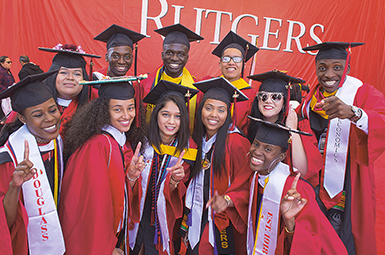Access and Opportunity

Celebrating their graduation from Rutgers in 2017 are members of the first cohort of Rutgers Future Scholars.
The University worked to keep a Rutgers degree affordable for New Jersey families. Tuition increases were held to an average of 2.4 percent from 2013 to 2019, which compared with a 3.9 percent average annual increase over the previous five years.
New financial assistance programs introduced at Rutgers University–Newark (RU-N to the Top) and Rutgers University–Camden (Bridging the Gap) guarantee that students whose family income is $60,000 or less will have their tuition fully covered. Both have shown strong results.
At Rutgers University–Newark
- First-year enrollment grew from 1,050 in 2013 to 1,300 in 2018
- The enrollment of Newark residents increased by 59 percent in those years
At Rutgers University–Camden
- First-year enrollment moved from 500 in 2013 to 1,000 in 2018
- Two-thirds of incoming undergraduates in 2018 were African American or Hispanic
At Rutgers University–New Brunswick
- A model of access among Big Ten public universities, Rutgers University–New Brunswick had the largest percentage of federal Pell grant recipients and the smallest gap in graduation rates between Pell and non-Pell students as of 2019